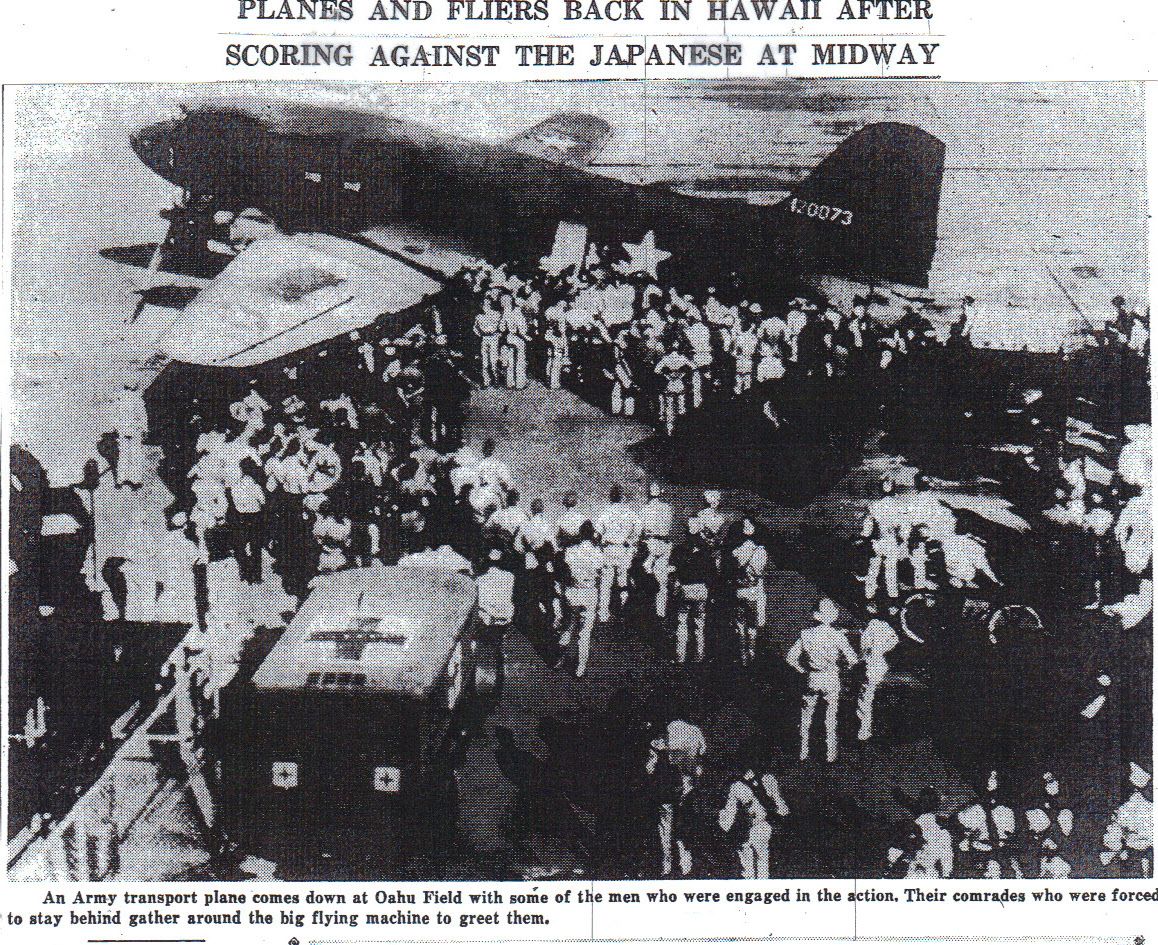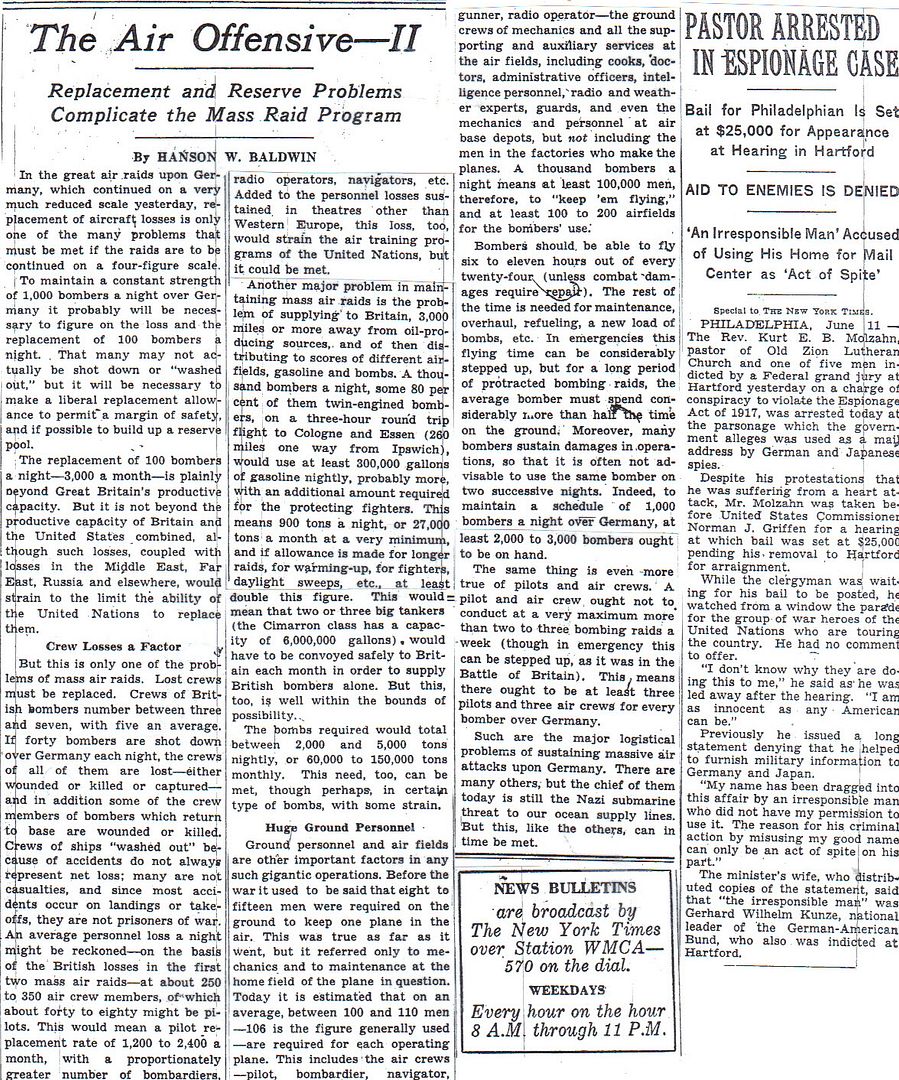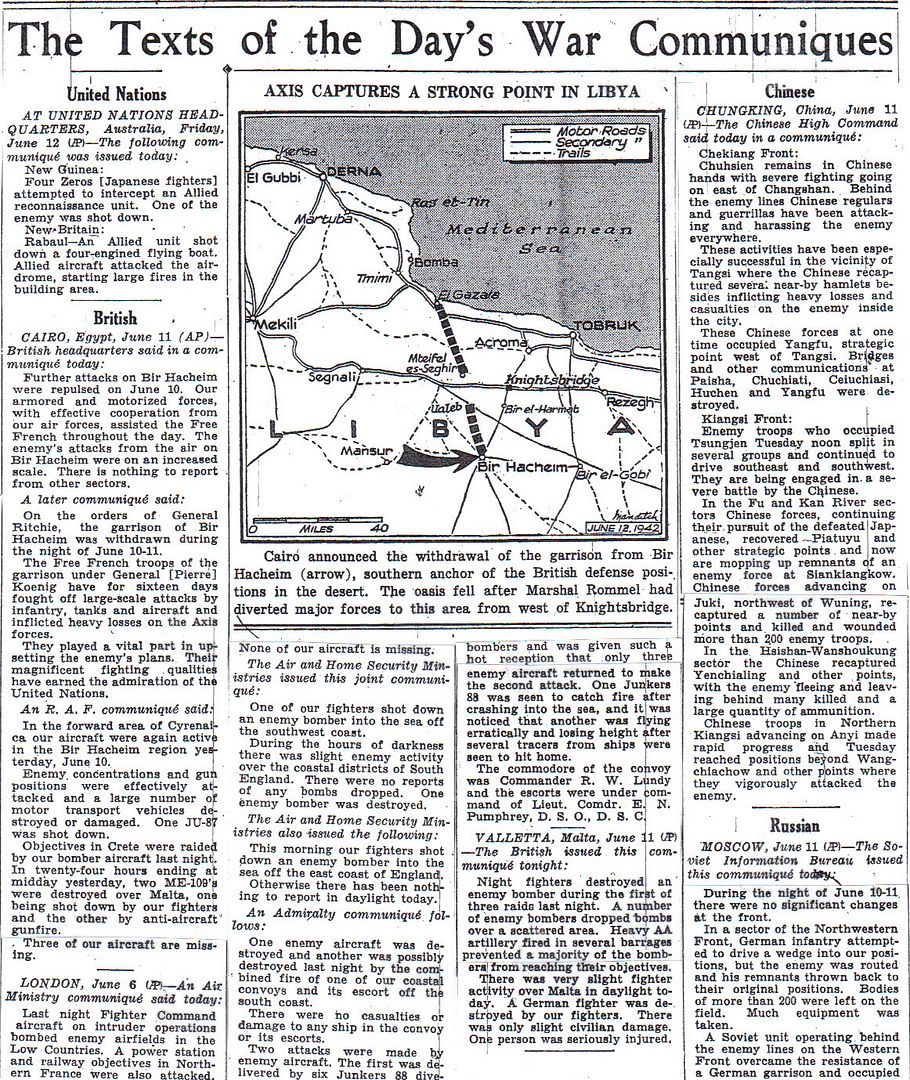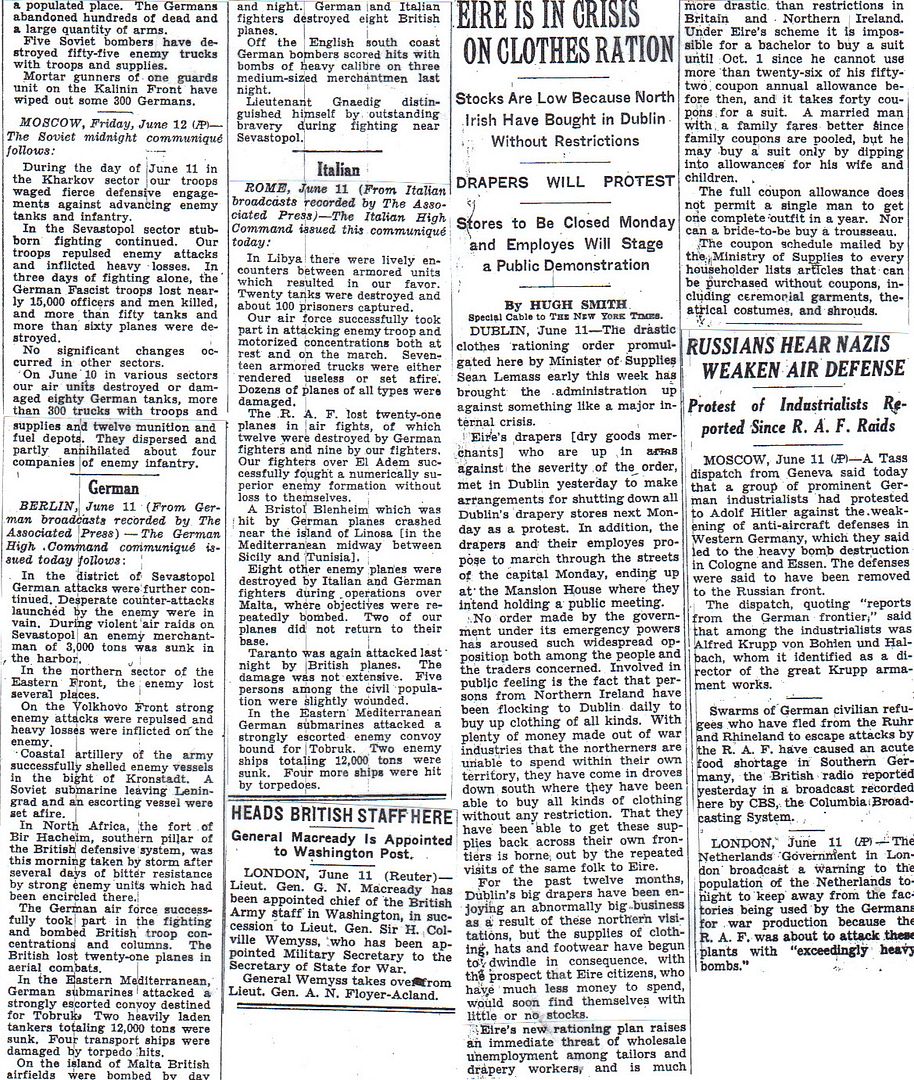
Posted on 06/12/2012 4:39:47 AM PDT by Homer_J_Simpson


















http://www.onwar.com/chrono/1942/jun42/f12jun42.htm
British lose armor in battle
Friday, June 12, 1942 www.onwar.com
In North Africa... The British Guards Brigade is heavily attacked by Rommel’s forces. The British counterattacks are ineffectual. One hundred British tanks are lost in the actions, leaving only 70 tanks operational. Rommel’s forces have twice that number and withdrawal of the British forces is inevitable. The Germans are recovering many of their own damaged tanks, repairing them and putting them back into service.
http://homepage.ntlworld.com/andrew.etherington/frame.htm
June 12th, 1942
UNITED KINGDOM: Canada and Russia signed agreement in London to resume diplomatic relations. (There had been no diplomatic relations between Canada and Russia for 6 years).
Destroyer HMS Swift laid down.
AA cruiser HMS Scylla commissioned.
Minesweeping trawler HMS Sir Argavaine commissioned.
Destroyers HMS Catterick and Glaisdale commissioned.
(Dave Shirlaw)
FRANCE: Paris: A Bristol Beaufighter (T 4800) of No. 236 Squadron Coastal Command, flown by F./Lt. A. K. Gatward, hedge-hops all the way to Paris in daylight and drops a tricolore on the Champs-Élysées as gesture of defiance. It then attacks the Gestapo headquarters with cannon-fire. (22)
GERMANY: Himmler approves a long-term plan for moving 30 million Slavs from occupied eastern Europe to Siberia.
U-542 is laid down. (Dave Shirlaw)
U.S.S.R.: Sevastopol: The Soviet army claims to have killed 15,000 Germans in the last three days.
MEDITERRANEAN SEA: After escorting convoy AT.49 to Tobruk destroyer HMS Grove with only one screw operating runs aground near Raz Azzaz. Despite being refloated she is reduced to 8 knots and is torpedoed and sunk by U-77. There are 110 casualties and 80 survivors.
Destroyer HMS Grove sunk by U-77 north of Sollum. (Dave Shirlaw)
NORTH AFRICA: Rommel’s breakout continues. The British Guards Brigade maintains heavy pressure on the Germans. The British have lost 100 tanks. German tank losses are also severe but the Germans are better are at tank repair.
After escorting convoy AT.49 to Tobruk destroyer HMS Grove with only one screw operating runs aground near Raz Azzaz. Despite being able to refloat she is reduced to 8 knots and is torpedoed and sunk by U-77. There are 110 casualties and 80 survivors. (Alex Gordon)(108)
EGYPT: Cairo: At dawn, Twelve out of 13 B-24 Liberator bombs of the USAAF, flying from RAF Fayid, in the Suez Canal Zone, today attacked the Romanian oilfields at Ploesti, Hitler’s main source of fuel. Four of the 13 land at a base in Iraq which was designated for recovery of the flight, three land at other Iraq fields, two land in Syria, and four are interned in Turkey. These aircraft, of the HALPRO detachment (the bombing detachment for the China-Burma-India Theater) under command of Colonel Harry A Halverson enroute from US to China, are the first long-range bombers to appear in the Middle East. Five squadrons of them and one squadron of Flying Fortresses form two Heavy Bombardment Groups, and their presence is indicative of the growing strength of American air power in this theatre of war. They pose a threat to targets in southern Europe, previously our of range.
CHINA: Kiangshan falls to the Japanese.
The American Volunteer Group’s 1st Squadron shoots down four Nakajima Ki-27 Army Type 97 Fighter, Allied Code Name “Nate,” and five unidentified twin-engine aircraft over Kweilin at 0605 hours local. (Jack McKillop)
TERRITORY OF ALASKA: ALEUTIAN ISLANDS: The 11th Air Force continues bombing operations against Kiska Island. Crews of the six Boeing B-17 Flying Fortresses and one Consolidated B-24 Liberator claim damage to a cruiser and leave a destroyer burning after a near miss. The cruiser HIJMS Abukuma and four destroyers depart Japanese occupied Attu Island and reconnoitre Amchitka Island for possible airfields. Japanese flying boats fly over Atka Island and see a seaplane tender, USS Gillis, and eleven Consolidated PBY Catalinas alongside. (Jack McKillop)
CANADA: HMCS Ville de Quebec arrived Halifax from builder in Quebec City. (Dave Shirlaw)
U.S.A.: U-202 landed a saboteur team of 4 men on Long Island, USA. This was one of two such teams that landed within a week of each other on the US East Coast, the other team came aboard U-584. (Dave Shirlaw)
Off the coast of the U.S. German submarines sink two more armed U.S. merchant vessels. A tanker bound for Portland, Maine, is sunk by U-158 in the Gulf of Mexico 20 miles (32.2 km) east of Trinity Shoals Gas Buoy while a steamship is sunk by U-159 in the Caribbean off the coast of Panama. (Jack McKillop)
German submarine U-701 mines the waters off Cape Henry, Virginia. (Jack McKillop)
100th Infantry Battalion (Separate) is officially activated on the Oakland (California) docks. (Gene Hanson)
Submarine USS Shad commissioned.
Minesweeper USS Pursuit launched. (Dave Shirlaw)
ATLANTIC OCEAN: At 0612, the Dartford in Convoy ONS-100 was torpedoed and sunk by U-124 south of Cape Race. The master, 25 crewmembers and four gunners were lost. 14 crewmembers and three gunners were picked up by the British rescue ship Gothland and landed at Halifax on 17 June.
At 0854, the unescorted Hardwicke Grange was torpedoed twice by U-129 north of Puerto Rico near the Tropic of Cancer. The U-boat surfaced approximately one mile away two points of port bow and fired 26 high explosive rounds from the 105-mm deck gun. First, the navigating bridge was shelled, causing fires amidships. Then the fire was concentrated on the hull about the port bow until the vessel sank. Three crewmembers, the third engineer and two greasers, were lost on watch below. The master and 19 survivors landed at Monte Cristi, Dominican Republic after 13 days in a lifeboat. 23 survivors were picked up by the Athelprince and landed at Nuevitas, Cuba. 16 survivors landed at Môle St Nicolas, Republic of Haiti. The first officer, second engineer and 14 crewmembers were rescued by an unknown ship and landed at Jamaica. The master, Timothy McNamara, was awarded the Order of the British Empire (OBE) for bravery at sea.
At 0750, the unescorted Cities Service Toledo was torpedoed by U-158 20 miles east of the Trinity Shoal Light Buoy in the Gulf of Mexico, while she proceeded on a nonevasive course. Two torpedoes struck two seconds apart on the starboard side amidships in the #6 and #7 tanks. The tanker rapidly took a starboard list. Five minutes later two more torpedoes struck the starboard side about amidships at the #4 and #5 tanks, causing the tanker to burst into flames. The armed guards (the ship was armed with one 5in, two .50cal and two .30cal guns) stayed with the ship as long as possible and fired three rounds at a light thought to be the U-boat. The most of the eight officers, 28 crewmen and nine armed guards abandoned ship in two lifeboats, because all rafts and the two other lifeboats were destroyed. One of these lifeboats could not get clear the flames and the men had to jump in the water. The Cities Service Toledo sank about two hours after the second attack. The Norwegian motor tanker Belinda picked up the 17 men in the remaining lifeboat several hours later. Eight hours after the attack, the surviving 13 men in the water were picked up by the American steam tanker Gulfking and the Panamanian steam merchant San Antonio. All survivors landed at Burwood, Louisiana and were then sent to New Orleans, where four men were hospitalized. One officer, ten crewmen and four armed guards died.
While crossing the Bay of Biscay, U-105 was attacked by an RAAF 10 Sqn Sunderland. The boat sought shelter in El Ferrol, Spain the same day and stayed there for 16 days before leaving for her French base at Lorient where she was repaired. She sailed for the next time in late November. After crossing the Atlantic (submerged at day, surfaced at night).(Dave Shirlaw)
Re: 50 dollar per month pay for servicemen. Equivalent to $706 in 2012 dollars.
US military enlisted pay starts at $1491 in 2012. This excludes housing, substinance, uniforms, of course.
http://www.usinflationcalculator.com/
http://www.navycs.com/2012-military-pay-chart.html
The claim by the USAAF that their bombers were responsible for sinking the First Air Fleet probably rubbed a few Navy Men the wrong way.
Best,
Chris
Great articles.
I'm sure Col. Sweeney had naval aviators lining up to buy him drinks at the officers club.
By inserting the words “In Europe,” Russia limited her commitment so that she is not bound to lift a finger against the other enemy of Britain and the United States, Japan, except in the unlikely event that here armies or navy should enter this war-torn Continent. This limitation is cheerfully accepted here, for it is felt that the Russians have their hands full already.
There was considerable relief in parliamentary and diplomatic circles that the treaty contained no reference to post-war boundaries.......................
Churchmen who defy Hitler
In the days when Quislings were carrying on their traitorous activities, priests refused to countenance Masses for those “martyrs” who were shot, but with every show of reverence and respect they continued to bury dead British airmen. Cardinal van Roey forbade his priests to give communion to any pro-German in uniform or to sanction masses for the dead. He would not even permit uniforms in church.
Also, this is the first time I have seen the word Quisling used. He has aready made his mark in history it seems.
The Soviets and the Japanese did indeed have a non-aggression pact in place, although the value of such pacts was certainly open to question at the time. Both sides honored their pact committments for the obvious reason that, as noted, they had their hands full elsewhere.
The Pact was not indefinite; it had an expiration date. There is some disagreement over whether the Soviets broke the pact when they declared war on Japan in August 1945. The terms of expiration were open to interpretation in that each side had a time period to declare a non-renewal of the pact, and the Soviets declared war during the non-renewal period. The Japanese would claim the declaration came during the term of the pact. However, given the circumstances of the timing of their declaration of war against the United States, history has not recognized Japan as an aggrieved party for the short Russo-Japanese War of 1945.
As for the visit of Molotov, he is an answer to one of my favorite history trivia questions: Name the only person to shake hands with Stalin, Hitler, Churchill, FDR, DeGaulle and Mao.
Did he not also have a cocktail named after him?
He did, but it was not the kind I would drink. Kind of like taking flaming shots, you know.
Trivial on the surface, but if you were to explore the circumstances of each greeting you would develop a decidedly untrivial picture of the course of events in the middle of the twentieth century.
He had an amazing career surviving Stalin’s jungle (although his wife was purged) and then continuing a key role after Stalin’s death and on into the late 1950’s when he got on the losing side of the plot to oust Khruschev.
Even though he wouldn’t pee if his pants were on fire without authorization from Stalin, I have to rate him as the most important diplomatic figure of the 20th century. That’s because of the trivia question and what you noted about the importance of all those meetings.
In grim occupied Europe, the mood is lifted in one tiny corner for a birthday party for a newly-minted teenager. Her loving dad shows a Rin-Tin-Tin movie at her party, and she gets the autograph book she wanted, that she saw in a store window. She immediately repurposes it as a diary.
Although she died in a concentration camp before her sixteenth birthday, Time Magazine has called her one of the hundred most important people of the twentieth century, based on what she wrote in the autograph book. You may have it on your shelf, and can read what she wrote today, and later as she pondered WWII life.
Happy Birthday, Anne.
"This destitute girl, perhaps dead, lies on a street in the Warsaw Ghetto.
Notice the people who casually walk by.
Starvation became so common in Warsaw that several Jewish physicians undertook a self-study of the effects of famine that resulted from the horrible conditions imposed by the Germans.
They considered the study an act of resistance performed to commemorate the dead.
One of the doctors involved insisted that the study was proof that 'not all of me shall die!' "
Believe the Finns during their with the Russians refered to gasoline bombs as Molotov cocktails
Disclaimer: Opinions posted on Free Republic are those of the individual posters and do not necessarily represent the opinion of Free Republic or its management. All materials posted herein are protected by copyright law and the exemption for fair use of copyrighted works.